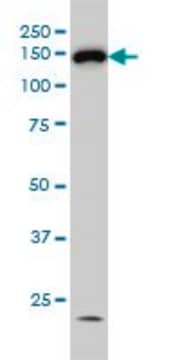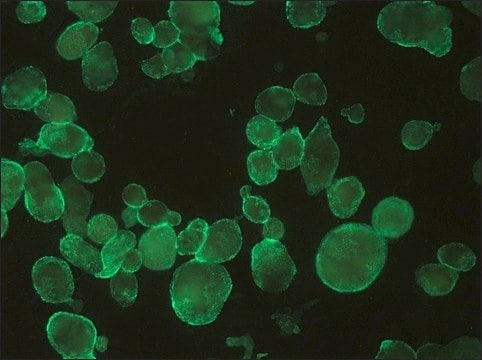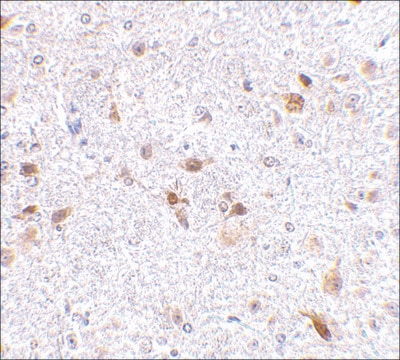推荐产品
生物源
mouse
品質等級
抗體表格
purified immunoglobulin
抗體產品種類
primary antibodies
無性繁殖
LP14, monoclonal
物種活性
virus
物種活性(以同源性預測)
all
包裝
antibody small pack of 25 μL
技術
immunocytochemistry: suitable
inhibition assay: suitable
western blot: suitable
同型
IgG2aκ
NCBI登錄號
UniProt登錄號
運輸包裝
ambient
目標翻譯後修改
unmodified
一般說明
Herpes Simplex Virus envelope Glycoprotein D (UniProt: Q69091) is also known as gD. The envelope of herpes simplex virus (HSV) is complex and contains at least 10 virus-encoded glycoproteins, some of which mediate virus entry into the host cell. HSV virus enters the cell by first fusing its envelope with a membrane of the host cell. Five viral envelope glycoproteins are reported to be involved in this entry process. Binding of glycoprotein D of HSV to a cell surface receptor is required to trigger membrane fusion during entry into host cells. Glycoproteins C and B promote attachment by interacting with cell surface proteoglycans and then glycoprotein D binds to the herpes virus entry mediator (HVEM) receptor that initiates a process that ultimately leads to glycoprotein B-mediated membrane fusion. Glycoprotein D is synthesized with a signal peptide (aa 1-25) that is subsequently cleaved off. It is a homodimeric protein that contains two zinc-binding sites (aa 64 and 264). The ectodomain region of glycoprotein D contains three sites for the addition of N-linked oligosaccharides (N-CHO) and six cysteine residues arranged into three disulfide bonds. During virion morphogenesis, glycoprotein D probably accumulates in the endosomes and trans-Golgi where secondary envelopment occurs. (Ref.: Whitbeck JC et al. (1997). J. Virol. 71(8); p. 6083 6093; Nicola, AV et al. (1998). J Virol. 72(5): 3595-3601; Giovine, PD et al. (2011). PLos Pathog. 7(9); e1002277).
特異性
Clone LP14 detects glycoprotein D of Herpes Simplex virus.
免疫原
Whole Herpex Simplex Virus 2 (HSV-2).
應用
Anti-Herpes Simplex Virus Glycoprotein D, clone LP14, Cat. No. MABF1975, is a mouse monoclonal antibody that detects Glycoprotein D of Herpes Simplex Virus and has been tested for use in Inhibition, Immunocytochemistry, and Western Blotting.
Research Category
Inflammation & Immunology
Inflammation & Immunology
Western Blotting Analysis: A 1:2,000 dilution from a representative lot detected Herpes Simplex Virus Glycoprotein D in lysates from VERO cells transfected with HSV-1.
Western Blotting Analysis: A representative lot detected Herpes Simplex Virus Glycoprotein D in Western Blotting applications (Lau, S.Y., et. al. (2015). Viruses. 7(3):915-38; Zenner, H.L., et. al. (2011). J Virol. 85(16):8012-21; Pawliczek, T., et. al. (2009). J Virol. 83(21):11254-64).
Western Blotting Analysis: A representative lot detected Herpes Simplex Virus Glycoprotein D in Western Blotting applications (Ren, Y., et. al. (2012). J Gen Virol. 93(Pt 2):319-29).
Immunocytochemistry Analysis: A representative lot detected Herpes Simplex Virus Glycoprotein D in Immunocytochemistry applications (Lau, S.Y., et. al. (2015). Viruses. 7(3):915-38).
Inhibition Analysis: A representative lot inhibited the fusion of cells infected with HSV-1. (Minson, A.C., et. al. (1986). J Gen Virol. 67(6); 1001-1013.
Western Blotting Analysis: A representative lot detected Herpes Simplex Virus Glycoprotein D in Western Blotting applications (Lau, S.Y., et. al. (2015). Viruses. 7(3):915-38; Zenner, H.L., et. al. (2011). J Virol. 85(16):8012-21; Pawliczek, T., et. al. (2009). J Virol. 83(21):11254-64).
Western Blotting Analysis: A representative lot detected Herpes Simplex Virus Glycoprotein D in Western Blotting applications (Ren, Y., et. al. (2012). J Gen Virol. 93(Pt 2):319-29).
Immunocytochemistry Analysis: A representative lot detected Herpes Simplex Virus Glycoprotein D in Immunocytochemistry applications (Lau, S.Y., et. al. (2015). Viruses. 7(3):915-38).
Inhibition Analysis: A representative lot inhibited the fusion of cells infected with HSV-1. (Minson, A.C., et. al. (1986). J Gen Virol. 67(6); 1001-1013.
品質
Evaluated by Western Blotting in HEK293T cell lysate transfected with HSV gD.
Western Blotting Analysis: A 1:2,000 dilution of this antibody detected Herpes Simplex Virus Glycoprotein D in HEK293T cell lysate transfected with HSV gD.
Western Blotting Analysis: A 1:2,000 dilution of this antibody detected Herpes Simplex Virus Glycoprotein D in HEK293T cell lysate transfected with HSV gD.
標靶描述
~50 and 55 kDa observed; 43.35 kDa calculated. Uncharacterized bands may be observed in some lysate(s).
外觀
Protein G purified
Format: Purified
Purified mouse monoclonal antibody IgG2a in PBS without azide.
儲存和穩定性
Stable for 1 year at -20°C from date of receipt. Handling Recommendations: Upon receipt and prior to removing the cap, centrifuge the vial and gently mix the solution. Aliquot into microcentrifuge tubes and store at -20°C. Avoid repeated freeze/thaw cycles, which may damage IgG and affect product performance.
其他說明
Concentration: Please refer to lot specific datasheet.
免責聲明
Unless otherwise stated in our catalog or other company documentation accompanying the product(s), our products are intended for research use only and are not to be used for any other purpose, which includes but is not limited to, unauthorized commercial uses, in vitro diagnostic uses, ex vivo or in vivo therapeutic uses or any type of consumption or application to humans or animals.
Not finding the right product?
Try our 产品选型工具.
儲存類別代碼
12 - Non Combustible Liquids
水污染物質分類(WGK)
WGK 2
閃點(°F)
does not flash
閃點(°C)
does not flash
Harrison M McCann et al.
ACS chemical biology, 17(5), 1269-1281 (2022-05-07)
Covalent antibody recruiting molecules (cARMs) constitute a proximity-inducing chemical strategy to modulate the recognition and elimination of cancer cells by the immune system. Recognition is achieved through synthetic bifunctional molecules that use covalency to stably bridge endogenous hapten-specific antibodies like
我们的科学家团队拥有各种研究领域经验,包括生命科学、材料科学、化学合成、色谱、分析及许多其他领域.
联系技术服务部门








